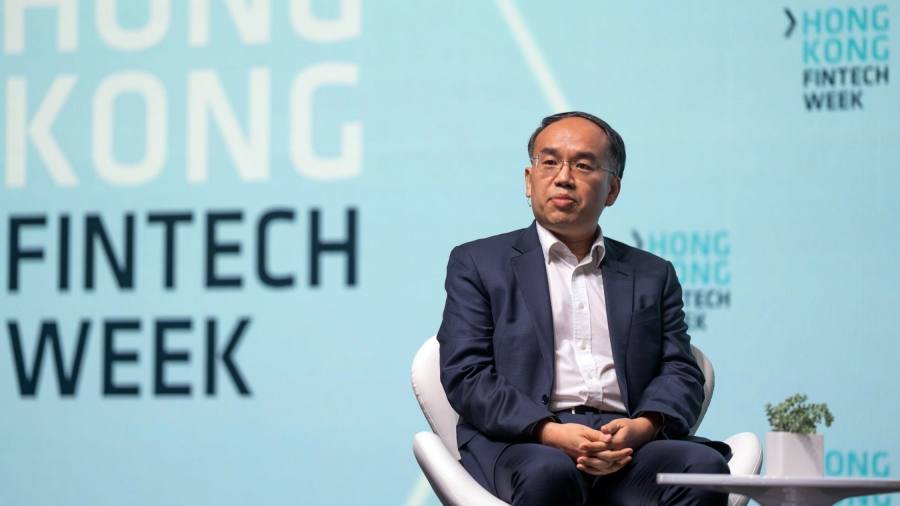
Hong Kong has kicked off a contest to become Asia’s crypto capital as investors and executives warn rival Singapore may be squandering its head start with its pivot to stricter regulation.
The sudden shift in Hong Kong last week towards clear rules for retail investors to trade digital assets follows years of ambiguity from regulators. That made some companies reluctant to build up a greater presence in the city, and capitalise on demand from mainland China, where crypto trading is outlawed.
Underscoring the problem, Huobi Global, one of the world’s biggest cryptocurrency exchanges, last week confirmed it would move its headquarters out of China, and was looking at the Caribbean.
“This kind of regulation [in Hong Kong], this kind of positive development, I think we have been waiting for [it for] five years,” said Lennix Lai, director of markets at OKX, a crypto exchange with offices in both Hong Kong and Singapore.
“The regulatory status of Hong Kong is very important on a global scale . . . industry participants are seeking a proper licence everywhere in the world, but what they really want is a regulatory status in a major financial centre,” Lai added.
That delay is reflected in the size of Hong Kong’s market in comparison to its great rival, Singapore. With around $74bn, Hong Kong trails Singapore in terms of the value of crypto assets received in the year to the end of June, with the latter’s total coming in at around $100bn, according to Chainalysis, a consultancy.
The clash between the two financial hubs came to a head last week, when they held overlapping fintech conferences. At their event, Hong Kong officials announced a public consultation on how retail investors could have a suitable degree of access to digital assets under a new licensing regime. Rules currently limit crypto trades to institutional investors with a portfolio of at least HK$8mn (US$1mn).
“I think [Hong Kong] could still regain that [leading global crypto hub] status,” said Sam Bankman-Fried, co-founder and chief executive of FTX. “It’s absolutely not too late for that.” FTX quit Hong Kong for the Bahamas last year owing to the city’s Covid restrictions and more regulatory clarity in the Caribbean.
In contrast, the Monetary Authority of Singapore proposed to tighten regulations for retail investors, after years of trying to attract some of the biggest names. The “crypto credit crunch” earlier this year revealed a number of companies with ties to Singapore, such as hedge fund Three Arrows Capital.
Ravi Menon, managing director of the central bank, said in a speech at Singapore’s fintech festival last week that the city-state did not want to be a hub for trading and speculating in the asset class. MAS has proposed barring retail investors from borrowing to invest in cryptocurrencies and requiring crypto exchanges to check that would-be buyers understand the risks.
The contrasting approaches have already prompted some to change their plans. “With the recent policy announcements, we will be prioritising and accelerating our business plans in Hong Kong over Singapore. Previously we planned to move our headquarters to Singapore, but now that plan is on pause,” said Adrian Wang, chief executive of Metalpha, a crypto asset management service provider.
Hong Kong’s shift comes despite the ban levied on crypto trading in mainland China. “Hong Kong seems to be positioning itself as a much more open jurisdiction for crypto trading as compared to Singapore, which is especially interesting in the context of how hard the mainland has cracked down,” said Zennon Kapron, head of fintech consulting firm Kapronasia.
The city is at pains to emphasise it has a regulatory system that is separate from mainland China. “The key elements that international investors or people come to Hong Kong for is our international connectivity . . . together with our access to China,” said Hong Kong’s financial services secretary Christopher Hui.
Singapore says it is still “embracing” crypto but focusing on institutional markets.
“We are embracing fully the underlying technologies of distributed ledgers and the potential that they have to transform financial markets,” said Lawrence Wong, Singapore’s deputy prime minister, as he opened its conference.
Analysts and industry executives said there would be greater clarity when the two cities published the final versions of their plans. “Hong Kong’s regime will be going into effect in March, and there’s plenty of time for Singapore to issue similar guidelines in the first quarter of next year,” said Vince Turcotte, Hong Kong-based director of digital assets at Eventus Systems.
But Hong Kong’s ambiguity on crypto may have already cost it as the hub of choice for companies and executives.
“I don’t look at the Hong Kong announcement as anything more than the whole region waking up to ‘this is real and here to stay’,” said Brooks Entwistle, a senior vice-president at cryptocurrency company Ripple. “But Singapore has been open for the last several years, making all the right moves to remain the long-term regional or global headquarters of choice for fintech and crypto organisations.”